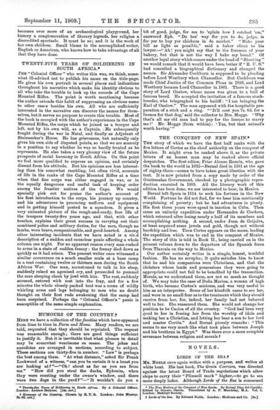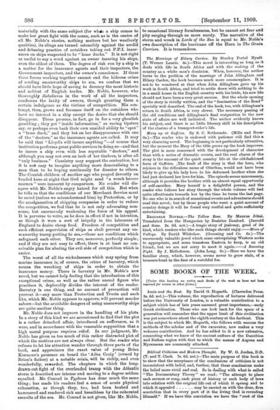NOVELS.
LORDS OF THE SEA.t Mn. NOBLE once again writes with a purpose, and writes at white heat. His last book, The Grain Carriers, was directed against the latest Board of Trade regulations which allow ships to carry their "Plimsoll mark" higher,—to go to sea more deeply laden. Although Lords of the Sea is concerned • The Time Iftstory of the Const of New Spain. By Bernal Bias del Castillo. Edited by Genaro Garcia. Translated by A. P. Mandalay, /LA. Vol. I. London : Bakluyt Society.
f Lords of the Sea. By Edward Noble. London ; Methuen and Co. Ds.] materially with the same subject (for what a. ship comes to make her great fight with the ocean, such as is the centre of all Mr. Noble's stories, nothing matters but her weatherly qualities), its slings are turned ostensibly against the sordid and debasing practice of outsiders taking out P.P.I. insur- ances on ships suspected to be " lame ducks." It is not right or useful to say a word against an owner insuring his ships, even the oldest of them. The degree of risk run by a ship is a matter for the insurance agents and their inspectors, the Government inspectors, and the owner's consoience. If these three forces working together cannot end the hideous crime of sending unseaworthy ships to sea, we confess that we should have little hope of saving to decency the most historic and noblest of English trades. Mr. Noble, however, who thoroughly disbelieves in the work of all the inspectors, condemns the laxity of owners, though granting them a certain indulgence as the victims of competition. His con- tempt, then, grows and focusses itself on the outsiders who hare no interest in a ship except the desire that she should disappear. These persons, in fact, go in for a very ghoulish gambling ; they get " inside information," as racing tipsters say, or perhaps even back their own unaided ability to "spot" a "lame duck," and they bet on her disappearance with one of the " doctors," as the insurance agents are called. It may be said that " Lloyd's will insure anything "—of course that institution performs great public services in doing so—and that to insure a ship even with less reputable "doctors," and although you may not own an inch of her timbers, is after all "only business." Casuistry may support the contention, but it is nob easy to imagine anything more demoralising to a man than to be hoping continually for disaster to others. The Cornish children of another age who prayed devoutly on bended knee at night that God might send "a wreck bevore marnen " were innocent by comparison. No reader will dis- agree with Mr. Noble's angry hatred for all this. But when he tells us that the conditions of our Merchant Service must be saved (unless we misunderstand him) by Protection, or by the amalgamation of shipping companies in order to reduce the competition, we feel that be is not only advocating non- sense, but enormously weakening the force of his appeaL It is perverse to write, as he does in effect if not in intention, as though it were a sort of iniquity in the labourers of England to desire cheap food. Freedom of competition and such efficient supervision of ships as shall prevent any un- seaworthy tramp putting to sea,—those are conditions which safeguard each other. They are, moreover, perfectly simple; and if they are not easy to effect, there is at least no con- ceivable plan for abating the evil side of competition which is easier.
The worst of all the wickednesses which may spring from marine insurance is, of course, the crime of barratry, which means the wrecking of ships in order to obtain the insurance money. There is barratry in Mr. Noble's new novel, but we cannot help feeling that the introduction of this exceptional crime, as well as the rather unreal figure who practises it, deplorably divides the interest of the reader. Barratry is one thing, and no amount of precaution will prevent it—any more than Protection and Trusts and such like, which Mr. Noble appears to approve, will prevent murder ashore—but the avoidable dangers of using unseaworthy ships are quite another thing.
Mr. Noble does not improve in the handling of his plots. In a story of this kind we are accustomed to find that the plot is a rather detached affair, introduced on sufferance, as it were, and in accordance with the venerable supposition that a high moral purpose requires relief. In our judgment, Mr. Noble has given us too much of this rather distracted plot of which the motives are not always clear. But the reader who refuses to let his attention wander through three parts of the book, and appreciates the exact value of young Brian Kenmore's presence on board the ' Ailsa Craig' (owned by Brian's father) at a notable crisis, will be richly, and even wonderfully, rewarded. The chapters in which the long- drawn-out fight of the overloaded tramp with the Atlantic storm is described are intense and moving to a degree seldom equalled. Mr. Conrad in Typhoon has done much the same thing ; has made his readers feel a sense of acute physical exhaustion, as though - they, too, had been bashed and hammered and rendered sick and breathless by the reiterated assaults of the sea. Mr. Conrad is not given, like Mr. Noble,
to occasional literary formlessness, but he cannot set fear and pity surging through us more surely. The narrative of the storm and wreck in Lords of the Sea is equal to Mr. Noble's own description of the hurricane off the Horn in The Grain Carriers. It is tremendous.







































 Previous page
Previous page